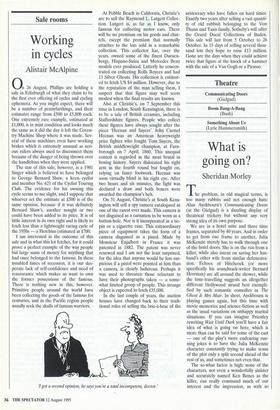Theatre
Communicating Doors (Gielgud) Boom Bang-A-Bang (Bush)
Something About Us (Lyric Hammersmith)
What is going on?
Sheridan Morley
The problem, in old magical terms, is too many rabbits and not enough hats: Alan Ayckbourn's Communicating Doors (at the Gielgud) is a dazzling display of theatrical trickery but without any very strong idea of its own purpose.
We are in a hotel suite and three time frames, separated by 40 years. And in order to get from one frame to another, Julia McKenzie merely has to walk through one of the hotel doors. She is on the run from a killer, while also intent on saving her hus- band's other wife from similar defenestra- tion. Echoes of Hitchcock (or more specifically his soundtrack-writer Bernard Herrman) are all around the shower, while the time-travelling suggests an altogether different Hollywood strand best exempli- fied by such romantic comedies as The Ghost & Mrs Muir. In short, Ayckbourn is playing games again, but this time with movie memories and science-fiction as well as the usual variations on unhappy marital situations. If you can imagine Priestley rewriting Wait Until Dark you'll have a fair idea of what is going on here, which is more than can be said for some of the cast — one of the play's more endearing run- ning jokes is to have the Julia McKenzie character constantly trying to make sense of the plot only a split second ahead of the rest of us, and sometimes not even that.
The so-what factor is high: none of the characters, not even a wonderfully sinister and accurately named Ken Bones as the killer, can really command much of our interest and the impression, as with so much late Ayckbourn, is of a writer push- ing his typewriter into ever tighter corners in the hope that escaping will keep him awake. His own staging is as endlessly ver- satile as his writing, but it's all still trickery.
After the disaster of Tim Luscombe's Eurovision a couple of years ago, it's a brave young playwright who decides to tackle once again the somewhat specialist theme of gays and the Eurovision Song Contest, but Jonathan Harvey has come through from second starting-post to a con- siderable win. Boom Bang-A-Bang belongs to what might in homophobic terms be described as the six-queens-bitching-in-a- small-room school of drama, one which has an honourable stage tradition stretching all the way back from My Night With Reg to Boys in the Band across more than 30 years: indeed Harvey graciously acknowledges his debt by having one of his characters reading a well-thumbed script of Reg.
But Harvey is in a class of his own: the most prolific and awarded of our mid-20s dramatists, he writes here a joyous kind of living-room comedy. The shadow of Aids is still there, of course, but the only character to die of it does so before the curtain rises: his lover (Chris Hargreaves) decides to carry on with their annual ritual of a party to watch Eurovision, and to his Kentish Town flat arrives an assortment of sexual and social misfits including, unusually, a couple of lesbian lovers and (more stereo- typically) a druggie who sets fire to the balcony, and a malicious old maker of others' troubles.
Plots have never been Harvey's main consideration, and this one lurches farcical- ly all over Kathy Burke's Bush Theatre production: but he has a rare gift for conveying joy in confinement, and for writing about people for whom sex is noth- ing more special than running water, but no less necessary to their everyday lives. Harvey may be guilty of writing caricatures rather than characters, but they are imbued with such energy that the cartoon moves swiftly enough to carry its audience along just ahead of their doubts.
At the Lyric Hammersmith Studio, Andrew Alty's Something About Us is by contrast a gay play gone horribly wrong because a fatally pompous portentousness has been allowed to overtake any real sense of theatre. It consists of two duo- logues: in the first, Michael (Simon Beres- ford) and Peter (James Kennedy) are whiling away some eternal aircraft delay by pondering on life, love, death and the universe. Peter has Aids, however, and is gone by the interval: for the second duologue we get Michael in bed with a bit of rough trade (Gregory Donaldson), try- ing to come to terms with his friend's death and his own inability to come out of the closet. By the time Philip Howard's pro- duction, two hours going on 30, had ground to a halt I was hoping somebody would force all three of them back into the closet and lose the key.



















































 Previous page
Previous page